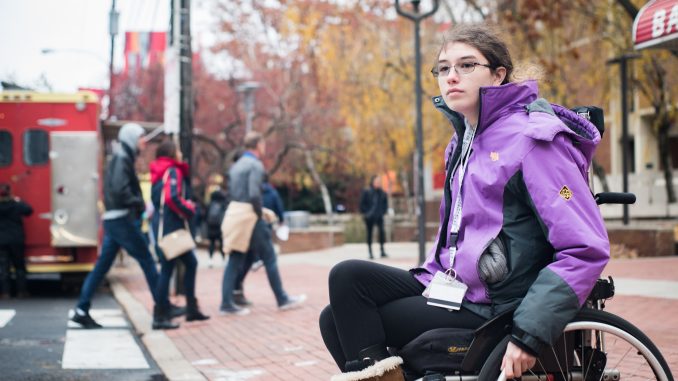
Olivia Chaves recalls traveling from her room at Morgan Hall North to her class at Presser Hall, and facing an unexpected challenge along the way: the pavement on Montgomery Avenue.
The road had been pulled up so the asphalt could be repaved, and while many people could continue walking across the road, Chaves, a sophomore music education major — who uses different mobility devices like crutches, a walker and a wheelchair — could not.
Any alteration or construction that can to limit the accessibility of a path must be designed and executed so as to make the path as accessible as possible. Such “paths of travel” include sidewalks, streets, parking areas and more, according to the 2010 Americans with Disabilities Act Standards for Accessible Design.
Chaves, like other Temple students who use devices for independent mobility, faces challenges while traveling around campus because of construction.
Chaves has Ehlers-Danlos syndrome, a genetic condition characterized by overly flexible joints and stretchy, fragile skin, according to the Mayo Clinic. Although Chaves thinks Temple is an accessible campus overall, she said she has had issues traveling on sidewalks around campus.
Chaves has faced issues with elevators, handicap door push buttons not working, and restrooms and classrooms not being fully accessible.
“It’s really frustrating that it’s such little things that make a huge difference for me,” she said. “That it wouldn’t be that much of an adjustment for other people to make, that really makes me frustrated.”
David Thomas, the associate director of student services of DRS, said that sidewalks are an issue, but it is not one the university can address.
“One barrier that we run into is that because the streets belong to the City of Philadelphia, that’s not anything we really have control over,” he said.
Temple is responsible for repairing elevators and handicap door buttons, reassigning classrooms to accommodate accessibility issues and maintaining accessible restrooms, Thomas added.
Temple Student Government created an ADA Task Force, which addresses environmental barriers like inaccessible bathrooms and classrooms on campus, in 2016. Last month, Parliament passed a resolution to start the task force again, The Temple News reported.
Jonathan Atiencia, a continuing studies film and media arts major and the Parliament’s disability resources and services representative, said his goal for the task force is to establish yearly check ups of Temple’s buildings next semester.
“Our campus was not designed for students with disabilities,” Atiencia said. “We want to know if Temple University is following the ADA laws to provide a safe, healthy and secure environment for students with accessibility needs.”
Lauren Mayer, a junior speech, language and hearing science major also has Ehlers-Danlos, and she is mostly impacted by postural orthostatic tachycardia syndrome (POTS). The condition makes it difficult for a person to stand for a long time. If someone with POTS does, they could experience nausea, fatigue or faint, according to John Hopkins Medicine.
Mayer said she fainted frequently in the past, so when she came to Temple, she was very excited to hear about the free campus shuttle services, only to be disappointed when she found out the service operates in the evening. Flight operates from 6 p.m. to 3 a.m. all week, according to the university’s Campus Operations page.
Because of this, Mayer has to spend out of pocket money on ride-sharing services to get to campus from her off-campus apartment on Jefferson Street near Willington Street. If she walks to campus, she has to leave much earlier.
“I typically will leave like about 30 minutes before class instead of the 10 minutes it should take to walk to Temple from my apartment,” she said.
Mark Gottlieb, the associate director of operations and logistics of Campus Operations, said all shuttle services are accessible to students with ADA approved equipment, and the office is always looking to improve shuttle services, in an email to the Temple News.
Chaves feels that there is a growing awareness among her peers. From opening doors for her to moving out of her way when she’s using her wheelchair, she said she appreciates the consideration she’s been shown.
“I think that people would want to change things that they knew about,” Chaves added. “I think it just doesn’t occur to so many people all the little tiny things that are inaccessible.”


Be the first to comment